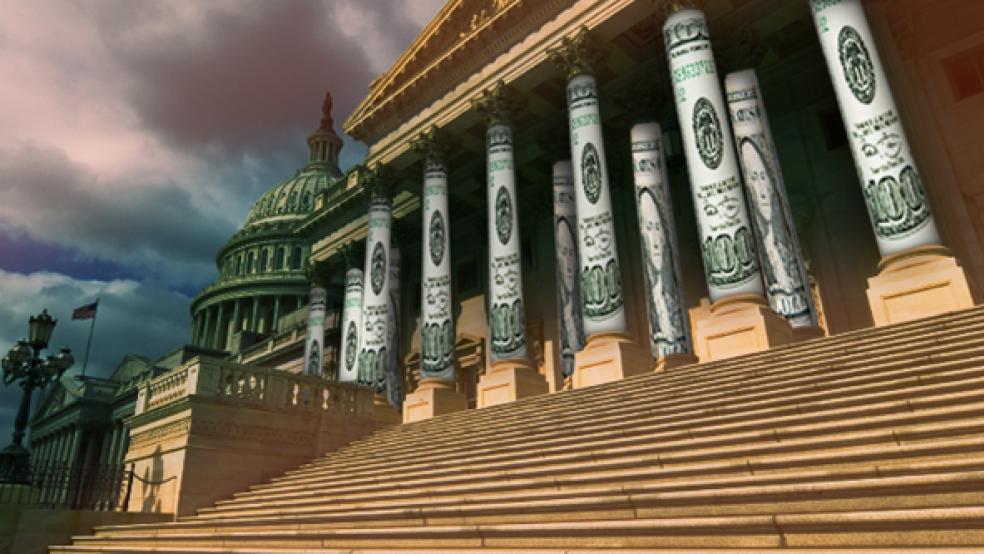When congressional Republicans last blocked an increase to the debt limit in 2011, global markets swooned, Standard & Poor’s stripped the government of its gold-plated credit rating, and top economists freaked out about a possible recession.

The same group is dusting off that strategy for the current fiscal cliff talks.
In the summer of 2011, the GOP goal was to achieve massive spending cuts in return for increasing the borrowing limit. The strategy worked in that sense, but it also put the country on the brink of a default more fitting for a third-rate global backwater than the essential ingredient in Pax Americana.
President Obama escaped relatively unscathed from the ordeal. Polls showed that nearly three-fourths of Americans blamed the GOP for placing their partisan interests above the national well-being. There’s no way of gauging exactly how that fiasco impacted the outcome of this year’s presidential election, but the consequences were favorable for Obama and the Democratic-majority Senate.
Knowing that his leverage on stopping Obama’s proposed tax rate hike on the wealthiest two percent is limited, House Speaker John Boehner is insisting that any further increase in the Treasury’s borrowing authority be matched dollar-for dollar with cuts in government expenditures.
Republican Senators Bob Corker of Tennessee and Lindsey Graham of South Carolina said this week that, if need be, the Republicans would once again tempt default. “The only way I would make the debt ceiling part of a year-end deal is if it had significant entitlement reform,” Graham said. “Then, if we don’t get significant entitlement reform in the end of the year deal, then the next place to get it” is when the Treasury exhausts its borrowing authority by mid February.
“The president is going to be in for a rude awakening if he thinks he’s going to get the debt ceiling increase without addressing [entitlements and] lowering debt,” Graham told The Fiscal Times.
Some political and policy experts voiced dismay Wednesday that the Republicans would stumble down this path again, despite stern warnings from Standard & Poor’s, Moody’s and other bond rating agencies that a repeat of the 2011 brinksmanship would almost certainly trigger another credit rating downgrade. Should the strategy work as it did previously for the Republicans, the GOP could find it harder to hang on to control of the House in 2014.
PLAYING WITH FIRE
“If Republicans are looking to damage their brand further, then they should play hostage politics with the debt ceiling,” said Larry Sabato, a University of Virginia political scientist. “Such a maneuver will go over like a lead balloon with the public, which is clearly tired of fiscal antics and wants the White House and Congress to reach a reasonable compromise.
“The GOP got most of the blame in 2011, and this time I guarantee it will be worse,” Sabato said. “Every single nonpartisan poll has shown that the public is poised to blame the GOP by a wide margin for any deadlock or blowup.”
G. William Hoagland, a former Republican Senate Budget Committee chief of staff, dismissed GOP talk of another debt-ceiling showdown as high risk and ultimately a “fruitless” strategy.
“I think it puts us right back into that risky path and once again highlights some of the dysfunction of our political process,” said Hoagland, who is now a senior adviser at the Bipartisan Policy Center. “Once again, it calls into question our ability to make decisions, and it further jeopardizes our credit rating status.”
Obama has made it clear he will not repeat his mistake of allowing the Republicans to treat the country’s debt ceiling as a bargaining chip, with so much riding on getting the economy back on track. The Treasury’s current $16.4 trillion borrowing authority will be tapped out early next year, and the president is demanding that Congress cede him the authority to raise the debt ceiling independent of the legislative branch.
“We are not going to play that game next year,” Obama said in a speech to the Business Roundtable last week. “If Congress in any way suggests that they’re going to tie negotiations to debt ceiling votes and take us to the brink of default once again as part of a budget negotiations . . . I will not do it.”
Tackling the rising costs of Medicare, Medicaid and other entitlements is, however, necessary to protect the economy. After Standard & Poors downgraded the U.S. credit rating last year, the agency issued a press release, which included this statement:
We lowered our long-term rating on the U.S. because we believe that the prolonged controversy over raising the statutory debt ceiling and the related fiscal policy debate indicate that further near-term progress containing the growth in public spending, especially on entitlements, or on reaching an agreement on raising revenues is less likely than we previously assumed and will remain a contentious and fitful process. We also believe that the fiscal consolidation plan that Congress and the Administration agreed to this week falls short of the amount that we believe is necessary to stabilize the general government debt burden by the middle of the decade.
Boehner took to the House floor on Tuesday to attack the administration’s latest proposals for achieving $4 trillion of deficit reduction over the coming decade as disturbingly vague on spending reductions. “We’re still waiting for the White House to identify what spending cuts the president is willing to make” as part of Obama’s “balanced approach,” Boehner said.
ZERO TOLERANCE IN 2013
This time, however, the stalemate could have a calamitous effect. A recent study by the Bipartisan Policy Center warns there will be far less time than before to work out a new agreement before the Treasury hits the debt limit. By mid-February 2013, it will have insufficient cash on hand to make every payment.
The government last year used a series of financial maneuvers and tricks to forestall a default for nearly 11 weeks before lawmakers finally struck a deal in early August. This time, Treasury will have no more than four to eight weeks before hitting a wall, according to the study. That’s because the government will be paying out far more – in federal tax returns and interest and principle on its debt -- than it will be taking in early next year.
Moreover, the government will be sure to waste an inordinate amount of taxpayers’ dollars if it has to play that game again. Treasury was forced to squander an estimated $18.9 billion long term in excess interest costs and premiums to continue meeting federal financial obligations while the debt ceiling talks dragged on in 2011.
The renewed threat of using the debt ceiling to force major savings in Medicare, Medicaid and other entitlement programs is born of frustration over the president’s proposals that depend heavily on fresh tax revenues to slow the growth of spending in the coming decade.
According to a recent analysis by Steven Rattner, a private equity investor and the former auto industry advisor to the Treasury Department, Obama’s long-term deficit reduction strategy is a mix of 47 percent tax increases, 17 percent entitlement savings, 19 percent reductions in discretionary spending on government services and programs, and 17 percent miscellaneous savings. Boehner’s approach, by contrast, is a mix of 22 percent increased revenues, 31 percent entitlement cuts, 31 percent discretionary savings and 16 percent all others.
AN UNSUSTAINABLE SPENDING PATH
Throughout the 1990s and 2000s, government spending stayed relatively constant at 33 to 35 percent of the gross domestic product, but in the aftermath of the economic meltdown of 2008 and subsequent recession, spending has jumped up to 40 percent of GDP.
Federal entitlements are driving this spending growth, having increased from less than half of total federal outlays just 20 years ago to nearly 62 percent in 2012, according to a Heritage Foundation analysis. Medicare, Medicaid and Social Security soak up about 44 percent of the overall budget. All three programs are growing faster than inflation, and—when joined with $1.7 trillion in new health care reform spending—will consume about 18.5 percent of the nation’s total economic output by mid-century.
Voicing his party’s frustration with the administration, Rep. Scott Garrett, R-N.J., said this week at a Politico seminar on financial services, “We have been saying the same thing . . . for the last two years. When is the White House going to engage and get serious and actually give us something in writing – specific legislation – that will solve the issue of our spending problems in this country.”
Michael A. Calabria, director of financial regulation studies at the libertarian Cato Institute, added that “our long term fiscal issues are driven first and last by Medicare, and everything else is a rounding error.”
But in their zeal to force the Democrats to make concessions, Republicans may be badly overplaying their hand again in negotiating over a major deal to avoid the fiscal cliff and keep the government operating.
Veteran pollster John Zogby said, “They [Republicans] have no nuance on that anger -- like the gorilla who was taught to play golf. He hits the ball 400 yards down the middle of the fairway, a foot from the cup. Takes out a driver and hits the ball another 400 yards.”
“The point they miss is that shutting the government down doesn't work for them because even their own base depends on government,” Zogby said. “Obama won and is holding the cards. Risking the fiscal cliff will only hurt GOP again. They will be blamed.”





